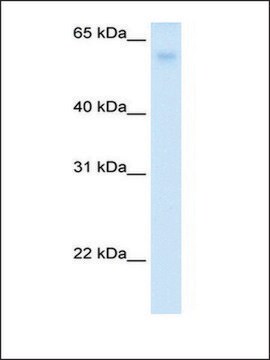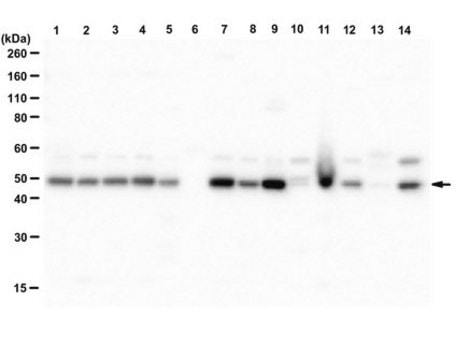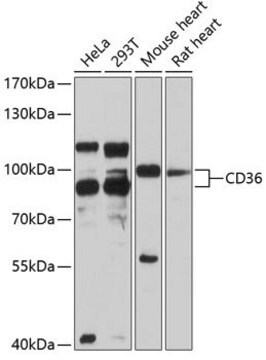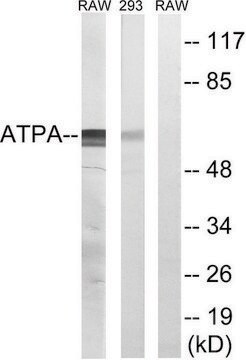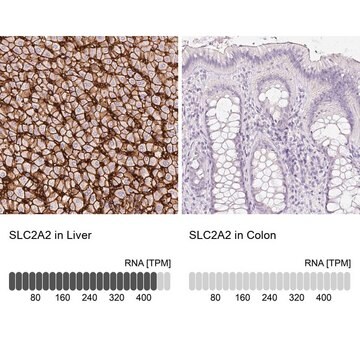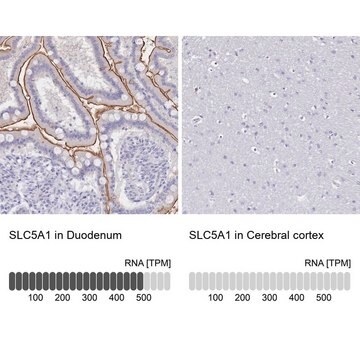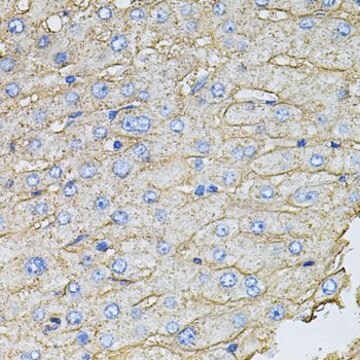07-1417
Anti-SGLT-1 (Sodium Glucose Co-transporter-1) Antibody
serum, from rabbit
동의어(들):
Sodium/glucose cotransporter 1, Solute carrier family 5 member 1, Solute carrier family 5 (sodium/glucose cotransporter), member 1, Solute carrier family 5 (sodium/glucose transporter),member 1
로그인조직 및 계약 가격 보기
모든 사진(4)
About This Item
UNSPSC 코드:
12352203
eCl@ss:
32160702
NACRES:
NA.41
추천 제품
생물학적 소스
rabbit
Quality Level
항체 형태
serum
항체 생산 유형
primary antibodies
클론
polyclonal
종 반응성
pig, rat, avian, rabbit, mouse, canine, human, reptile, feline
기술
ELISA: suitable
immunohistochemistry: suitable (paraffin)
western blot: suitable
동형
IgG
NCBI 수납 번호
UniProt 수납 번호
배송 상태
dry ice
타겟 번역 후 변형
unmodified
유전자 정보
human ... SLC5A1(6523)
일반 설명
The kidneys play a major role in the regulation of blood glucose. Although kidney nephrons indiscriminatly filter about 180g of glucose per day from the blood, most is reabsorbed actively in the proximal convoluted tubule by a Na+/Gl co-transport (ratio 2:1) mechanism (SGLT). Typically, glucose is first reabsorbed by these transporters, which reside within the brush-border epithelia of the PCT cells. The glucose is then transported out of the cell across the basolateral membranes by a facilitated diffusion sugar transporter (GLUTs). At least three members of SGLT′s (SGLT1-3) have been cloned and characterized from various species. SGLT1-3 genes code for protein of approximately 659-672 residues, with both N and C termini predicted to be extracellular. There is approximately 60-70% homology between the 3 forms. SGLT1 does not discriminate a-MDG, glucose and galactose, while SGLT2 and 3 do not transport D-galactose efficiently. SGLT1 is an integral membrane protein expressed in proximal convoluted tubule Sq1 segments of the kidney (outer renal medulla) and in the intestine.
특이성
Recognizes SGLT-1.
면역원
Synthetic peptide corresponding to amino acids 402-420 in the cytoplasmic region of SGLT-1 of mouse/rabbit small intestine.
애플리케이션
Anti-SGLT-1 (Sodium Glucose Co-transporter-1) Antibody detects level of SGLT-1 (Sodium Glucose Co-transporter-1) & has been published & validated for use in WB, IH(P), ELISA.
Immunohistochemisty (paraffin): Anti-SGLT-1 staining on human kidney, tissue pretreated with citrate buffer, pH 6.0. A previous lot of this antibody was used at 1 μg/mL, using IHC-Select detection with HRP-DAB. Immunoreactivity is detected in the brush boarder of proximal convoluted tubule.
ELISA: 1:10,000 - 1:50,000 dilution of a previous lot, using 50-100 ng of control peptide/well.
Optimal working dilutions must be determined by end user.
Western Blot: A previous lot of this antibody was used on multiple lysates. See datasheet.
ELISA: 1:10,000 - 1:50,000 dilution of a previous lot, using 50-100 ng of control peptide/well.
Optimal working dilutions must be determined by end user.
Western Blot: A previous lot of this antibody was used on multiple lysates. See datasheet.
Research Category
Signaling
Signaling
Research Sub Category
Insulin/Energy Signaling
Insulin/Energy Signaling
품질
Routinely evaluated by Western Blot on PC3 lysates.
Western Blot Analysis:
1:500-1:2,000 dilution of this lot detected SGLT-1 on 10 μg of PC3 lysates.
Western Blot Analysis:
1:500-1:2,000 dilution of this lot detected SGLT-1 on 10 μg of PC3 lysates.
표적 설명
Recognizes a band of approximately 70-77 kDa in Western blot.
결합
Replaces: AB1352
물리적 형태
Rabbit polyclonal IgG antiserum in buffer containing 0.1% sodium azide.
저장 및 안정성
Stable for 1 year at -20°C from date of receipt in undiluted aliquots.
Handling Recommendations: Upon first thaw, and prior to removing the cap, centrifuge the vial and gently mix the solution. Aliquot into microcentrifuge tubes and store at -20°C. Avoid repeated freeze/thaw cycles, which may damage IgG and affect product performance.
Handling Recommendations: Upon first thaw, and prior to removing the cap, centrifuge the vial and gently mix the solution. Aliquot into microcentrifuge tubes and store at -20°C. Avoid repeated freeze/thaw cycles, which may damage IgG and affect product performance.
분석 메모
Control
PC3 cell lysate
PC3 cell lysate
면책조항
Unless otherwise stated in our catalog or other company documentation accompanying the product(s), our products are intended for research use only and are not to be used for any other purpose, which includes but is not limited to, unauthorized commercial uses, in vitro diagnostic uses, ex vivo or in vivo therapeutic uses or any type of consumption or application to humans or animals.
적합한 제품을 찾을 수 없으신가요?
당사의 제품 선택기 도구.을(를) 시도해 보세요.
Storage Class Code
10 - Combustible liquids
WGK
WGK 1
시험 성적서(COA)
제품의 로트/배치 번호를 입력하여 시험 성적서(COA)을 검색하십시오. 로트 및 배치 번호는 제품 라벨에 있는 ‘로트’ 또는 ‘배치’라는 용어 뒤에서 찾을 수 있습니다.
Intestinal and renal Na+/glucose cotransporters share common structures.
Hirayama, B A, et al.
The American Journal of Physiology, 261, C296-C304 (1991)
Glycosylation of the rabbit intestinal brush border Na+/glucose cotransporter.
Hirayama, B A and Wright, E M
Biochimica et Biophysica Acta, 1103, 37-44 (1992)
Identification of two unique polypeptides from dog kidney outer cortex and outer medulla that exhibit different Na+/D-glucose cotransport functional properties.
Silverman, M, et al.
Biochimica et Biophysica Acta, 1153, 43-52 (1993)
Balasubramanian Palaniappan et al.
Nutrients, 12(10) (2020-10-18)
In mammalian small intestine, glucose is primarily absorbed via Na-dependent glucose co-transporter (SGLT1) on the brush border membrane (BBM) of absorptive villus cells. Malabsorption of nutrients (e.g., glucose) leads to malnutrition, a common symptom of inflammatory bowel disease (IBD), where
Molecular biology approaches to comparative study of Na(+)-glucose cotransport.
Pajor, A M, et al.
The American Journal of Physiology, 263, R489-R495 (1992)
자사의 과학자팀은 생명 과학, 재료 과학, 화학 합성, 크로마토그래피, 분석 및 기타 많은 영역을 포함한 모든 과학 분야에 경험이 있습니다..
고객지원팀으로 연락바랍니다.